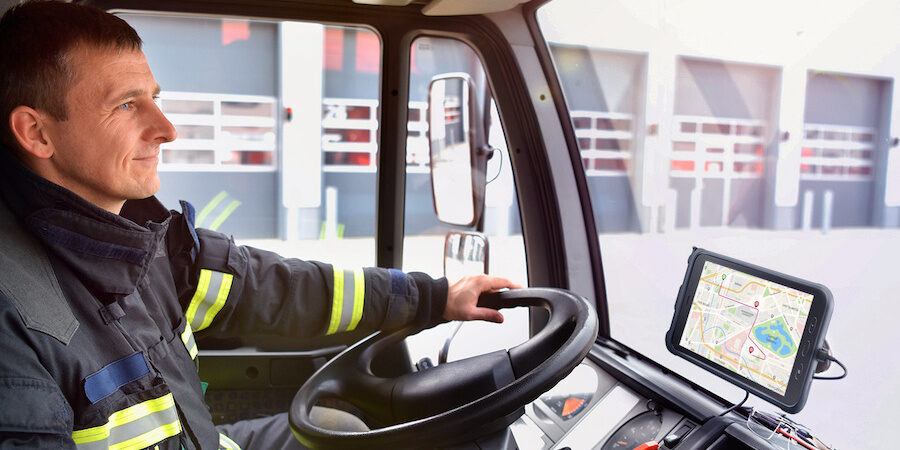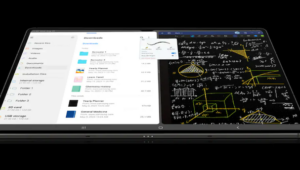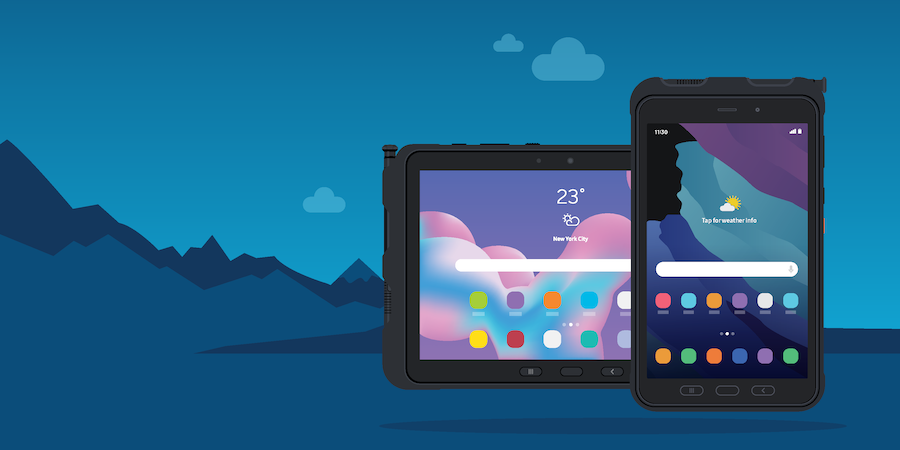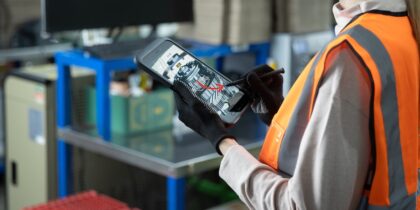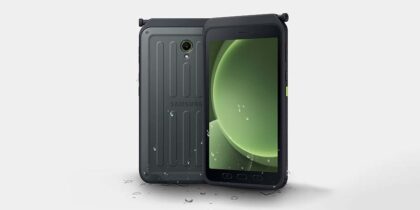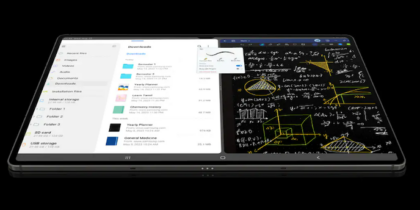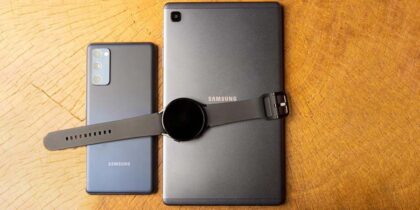Frontline workers frequently find themselves in harsh environments, from working in the pouring rain to climbing or crawling in dark, dusty spaces. The technology they use on the job gets more than the usual wear and tear. But smarter, more durable equipment — such as rugged tablets — can help workers power through their toughest days.
According to VDC Research, the rugged tablet market is expected to reach almost $1 billion by 2022, growing about 5.7 percent each year. The Windows 10 and x86 processor architectures have traditionally led in market share, but Android has made inroads with its support for enterprise workloads. Rugged tablets are becoming core equipment in frontline workers’ toolbox, as businesses continue digitizing workflows in industries such as utilities, public safety, transportation, logistics, manufacturing and the military.
For these industries, and for frontline workers in general, rugged devices offer a number of advantages. In a variety of use cases, rugged tablets are already improving productivity and streamlining operations.
Transportation gains logistics and performance insights
Rugged mobile devices have changed the operational landscape of the transportation industry. Tracking drivers’ location and hours of service (HOS) has historically been handled with a paper-based log, but now must be done electronically under the Department of Transportation’s ELD mandate. Transportation fleets also need more insight to improve fuel efficiency and track proof of delivery.
Today, rugged devices not only allow fleet managers to track HOS, driving habits and behavior behind the wheel, they also make it easy for drivers to complete other tasks around the truck, like electronic visual inspection reports. Samsung Galaxy rugged tablets such as the Tab Active Pro and the Tab Active3 can handle the elements, including rain and dust, as well as the vibrations of the road. With physical buttons — plus an S Pen — drivers can conveniently use the device while wearing gloves.
22 tests Samsung's rugged devices survived
See a full rundown of the MIL-STD-810G testing Samsung's rugged tablets passed in this infographic. Download Now
What’s more, with Wi-Fi and LTE capabilities, these tablets can be used for navigation assistance, with real-time updates on road conditions, approved routes and geofencing to direct trucks to the correct entry gate and loading dock. All of this enhances driver productivity and reduces fuel costs by avoiding excessive idling and route-finding.
Airlines take off with rugged tablets
Maintenance is a critical budget component for airlines. Flight delays are costly for everyone involved. By using maintenance, repair and operations (MRO) software, airlines and maintenance contractors can better manage the process across their fleets.
To support a digital MRO solution, a rugged mobile device needs to withstand drops, shocks, vibrations, rain, dust and freezing temperatures. And when passenger safety is at stake, security is also critical. Rugged devices like the Tab Active Pro and Tab Active3 can deliver enterprise-grade security and added peace of mind. With Samsung Knox on board, the entire Galaxy tablet line is protected from the chip up.
Choosing between these devices depends on what the customer needs. The Tab Active Pro’s 10.1-inch display is ideal for workers who need to consider a lot of data all at once. Meanwhile, the Tab Active3’s compact form factor (with an 8-inch display) allows mobile users to move between Wi-Fi hotspots around an airport without losing connectivity, thanks to the Tab Active’s multiple-input, multiple-output (MIMO) antenna system, which constantly chooses from the best two transmission paths.
What’s more, the Tab Active3 features a No Battery mode, allowing the device to run on an external power source to reduce risk of overheating. No Battery mode is useful for vehicle-mounted use cases or within an airport kiosk, allowing it to provide 24/7 service.
Even on commercial airplanes, an environment less exposed to the outdoor elements, airlines are finding that rugged tablets for in-flight entertainment and point of sale (POS) systems are often a smarter choice than consumer devices. Rugged devices are better able to handle the constant bumps of in-flight usage, so fewer tablets go out-of-order — lowering financial hits and helping prevent passenger frustration.
Warehouse management seeks rugged devices
Warehouse management and operations already use mobile devices to help with a number of tasks, including inventory tracking, consolidation and shipping. But more warehouse managers are now looking to upgrade their legacy mobile solutions for greater flexibility.
The internet of things (IoT) offers new potential for sensor-equipped devices to make warehouse operations truly smart, allowing for fast shipping at lowered costs.
Rugged devices built to work in harsh environments are an appealing solution for warehouse IT decision makers. According to Ivanti and VDC Research, nonrugged devices have a failure rate of 19.8 percent, compared to rugged devices’ 3.8 percent. Device failure costs an average of 30-40 minutes of worker downtime.
Enabling asset management in any environment
Tracking enterprise assets and equipment is a constant challenge. That goes double for businesses with extreme environments, heavy-duty manufacturing or large remote workforces. Often, their expensive capital investments see much more than wear and tear, and consumer-grade technology can’t stand up to conditions in the field.
For smarter asset management, the Tab Active Pro or Tab Active3 paired with IBM’s Maximo Anywhere solution lets enterprises equip their workforce with tools that track equipment more accurately and reduce the cost and complexities of daily operations — even in extreme heat, cold or other inclement conditions.
Protecting public and private data
Public safety agencies have embraced handheld and wrist-worn devices, including smartphones and tablets in the field. While many devices now feature IP68 certification — meaning they’re water- and dust-resistant — most are still vulnerable to drops. Both the Tab Active Pro and Tab Active3 have been tested against the military’s MIL-STD-810 standard — in addition to IP68 certification — ensuring they are durable and rugged enough to thrive in public safety. And with solutions like containerization and biometric authentication technology, first responders can be confident that sensitive data will remain accessible to those who need it and protected from those who don’t.
To make for easier management of enterprise mobile devices, the Tab Active3 comes in an Enterprise Edition supported by Knox Suite, offering IT and business leaders an end-to-end deployment, management and security solution. In addition to a one-year license to Knox Suite, the Tab Active3 Enterprise Edition includes five years of security maintenance updates and a three-year product life cycle assurance from the date of global launch, so it’s easy to add to your fleet after your initial purchase.
As the number of mobile workers continues to expand across industries, rugged devices that can handle field work will continue to improve worker productivity, lower costs and enhance data collection and insights.
Your field workers need equipment that’s as tough as they are. Learn more about how Samsung’s rugged tablets can help solve your toughest business challenges. And if you need a more compact rugged smartphone, consider the new Galaxy XCover Pro, which is also field-ready.
